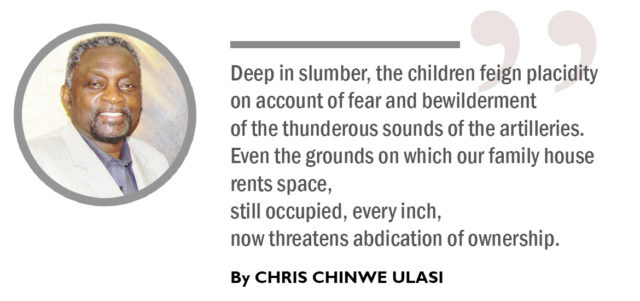The night was dark-blue in the face
with a pale-yellow eye;
an occasional passing glow filters through
a black smoke blanket covering
like dusk light through the windowpanes
of a dark room,—

The curtains are drawn.
Not a good day to have conversations
with the night:
it can barely see us;
not even a good month to listen to its stories—
A voice unsure about the sounds it speaks;
not even a fond season for romantic gestures
from its constellations -an ode to celestial vagaries.
Even the rainy season had a visitor from the Sahel;
they stayed long enough until thirst hung
with red ribbons of triumph.
The year has been painfully long…1969.
The ominous sounds of the 106 artillery.
For the children, the frequency had left refrains of nightmare;
the adults don’t listen to their children’s stories anymore.
In my town, Nnewi, the artilleries, fifteen miles away,
waited until we were asleep to tell their horror stories.
Deep in slumber, the children feign placidity
on account of fear and bewilderment
of the thunderous sounds of the artilleries.
Even the grounds on which our family house rents space,
still occupied, every inch,
now threatens abdication of ownership.
These sounds do not rhyme
as they bear down hard on the ground:
they leave imprints,
affectations of a case of heavy nerves.
All the while,
on the agitated and submerged lands
of this Biafra, life’s enemies are at work;
the messengers of misery are at work;
the yam barn is lonely.
Inside the hollow grounds, there is privacy
and silence, grim silence.
“And yet God’s children have died here.”
_____
Copyright © 2020 Chris Chinwe Ulasi
♦ Chris Chinwe Ulasi, Professor of Media and Communication, is on the Editorial Board of the West African Pilot News.

